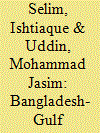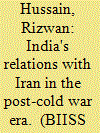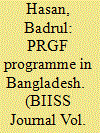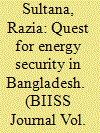|
|
|
Sort Order |
|
|
|
Items / Page
|
|
|
|
|
|
|
| Srl | Item |
| 1 |
ID:
083792


|
|
|
|
|
| Publication |
2008.
|
| Summary/Abstract |
The economic relations between Bangladesh and the oil rich Gulf Cooperation Council (GCC) countries are important for a developing nation like Bangladesh for a number of reasons. The countries of the Gulf, which are considered as one of the fastest growing economic blocs, remain the important sources of crude oil, remittances and overseas employment opportunities for Bangladesh and thus contribute significantly towards its economic development. Also, the Gulf nations have been assisting Bangladesh generously in various activities with aid and grants. In this backdrop, the current article will make an effort to assess Bangladesh's economic relations with the GCC countries. In the process of analysis, the article will look into trends and levels of remittances earned by Bangladesh from the Gulf nations. It will also focus on the current status of Bangladesh-GCC trade relations. Finally, this article will identify some challenges and prospects involved with the Bangladesh-GCC economic relationship.
|
|
|
|
|
|
|
|
|
|
|
|
|
|
|
|
| 2 |
ID:
083794


|
|
|
|
|
| Publication |
2008.
|
| Summary/Abstract |
This paper examines India's relations with Iran in the post-Cold War era. The dissolution of the Soviet Union in 1991 and the corresponding end of the bipolar East-West confrontation distinctly affected the pattern of foreign policy perceptions in the two major states of South and West Asia, namely, India and Iran, respectively. The paper analyses the transformation of India's relationship with Iran from being a distant neighbour in the Cold War to a potential regional ally in the post-Soviet era. It also outlines the strategic, political, and economic rationale behind India's attempts to forge strong ties with the Islamic Republic in the twenty-first century. It highlights the potential areas of co-operation between these two states and at the same time indicates the potential obstacles involved in developing a strong multifaceted relationship.
Among the many peoples and races who have come in contact with and influenced India's life and culture, the oldest and the most persistent have been the Iranians . . . it was out of some common stock that the Indo-Aryans and the ancient Iranians diverged and took their different ways. . . Iran like India, was strong enough in the cultural foundation to influence even her invaders and often to absorb them.
|
|
|
|
|
|
|
|
|
|
|
|
|
|
|
|
| 3 |
ID:
083789


|
|
|
|
|
| Publication |
2008.
|
| Summary/Abstract |
The paradigmatic shift in the concept of security now puts more stress on human security related to welfare of mankind in several ways. The concept of human security is a theme on which the research in an on-going process. Various political scientists, sociologists, economists, environmentalists, security and defense experts and the like are trying to study it from different angles, all with the purpose of better conceptualizing the concept and as well for finding out the means for making it more operational on ground. Interestingly, the concept is also being studied from a perspective that tries to link it with the other contemporary themes like globalization, human rights regime, environment regime, the phenomenon of collapsed state etc. In this respect, one notices very little efforts being expended to understand the concept from an oceanic perspective, notwithstanding the fact that the issues related to human security in the terrestrial environment find their relevance in the ocean medium too. However, such indifference to the marine dimension of human security cannot remain a long lasting phenomenon as the position of 'global oceans and seas' is currently in a state of crisis with impact on food security, health security, environmental security, personal security, community security of the individuals that depend on the ocean for their livelihood and sustenance. The management of oceanic affairs is a complicated task as ocean is a medium different from that of land. However, ocean governance is crafted in a manner that is capable of meeting many challenges that the oceans face at present. From human security perspective, meeting such challenges means prosperity and wellbeing of mankind. Bangladesh as a maritime nation also faces numerous critical human security problems in its maritime zone. It is, therefore, an imperative for the country to confront such challenges in line with the contemporary ocean governance.
|
|
|
|
|
|
|
|
|
|
|
|
|
|
|
|
| 4 |
ID:
083793


|
|
|
|
|
| Publication |
2008.
|
| Summary/Abstract |
Bangladesh, with its low per capita income, has been receiving concessional lending under the Poverty Reduction and Growth Facility (PRGF) programme of the International Monetary Fund (IMF) since 2003. Based on Special Drawing Rights (SDR), the total amount of approved loans is US$ 347 million that has been already disbursed in different rate of quota. The loans have been a significant source of foreign exchange reserve as well as supportive to the programmes of economic reforms in Bangladesh. As a result, macroeconomic performance of the recipient country has been moving ahead. This, in turn, has contributed to overall economic aspects of Bangladesh. At the same time, some economic factors of Bangladesh, such as, inflation, trade, domestic currency, etc., have been adversely influenced by the loans. A set of conditions associated with the loans are likely to gradually influence Bangladesh's fiscal and monetary policy, tax and trade policy, governance, etc. Against this backdrop, the focus of the present paper is to critically analyse the significant contributions to and the challenges for Bangladesh economy with the concessional lending of the PRGF programme by the IMF.
|
|
|
|
|
|
|
|
|
|
|
|
|
|
|
|
| 5 |
ID:
083791


|
|
|
|
|
| Publication |
2008.
|
| Summary/Abstract |
Energy security is one of the major policy concerns for Bangladesh. Currently, the country with its vast population is facing formidable challenges in supplying energy in spite of having some mineral resources and significant amount of renewable resources options. To understand the overall energy scenario of the country, existing reserves of renewable and non-renewable energy resources have been discussed in the paper. In the energy security context, several issues such as export of gas, electricity shortage and high dependency on imported oil are real threats to ensuring supply of energy to meet the growing demand. These issues have been discussed within the conceptual framework of energy security for the country's rapid economic growth. To overcome the challenges, sustainable energy development through intra-regional cooperation with SAARC, BIMSTEC and extra-regional collaboration with the OPEC countries has also been touched upon in the paper.
|
|
|
|
|
|
|
|
|
|
|
|
|
|
|
|
| 6 |
ID:
083790


|
|
|
|
|
| Publication |
2008.
|
| Summary/Abstract |
The year 2007 for South Asia has been a mixture of both turmoil and remarkable achievements, making it more talked about in world affairs. Almost all the nations in the region saw domestic political unrest during the period, and perhaps the single most incident that shook the region just by the end of the year was the assassination of Pakistan's ex -Prime Minister Benazir Bhutto. Other significant incidents throughout the year included declaration of the state of emergency in Bangladesh, instabilities in Nepal, stalled peace process in Sri Lanka, and wobbly move towards democratization in Bhutan and Maldives. On a regional plane, there were no significant regional initiatives under the aegis of SAARC, except some regular ministerial meetings and forums, and no initiatives for conflict resolution. For bilateral relationship, India-Pakistan relations maintained the status quo whereas an improvement in Bangladesh-India relationships was evident. Against this backdrop, the paper attempts to provide a review of all these events and issues that occurred in South Asia in 2007, with a focus on their implications for regional peace and security. Moreover, throughout the discussion, an attempt has also been made to assess the argument that the domestic and/or internal factors became prominent in South Asia in the year of 2007
|
|
|
|
|
|
|
|
|
|
|
|
|
|
|
|
|
|
|
|
|